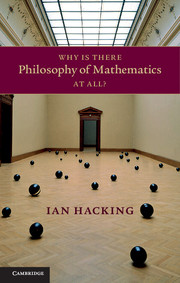Book contents
Chapter 4 - Proofs
Published online by Cambridge University Press: 05 June 2014
Summary
The contingency of the philosophy of mathematics
Chapter 3 diagnosed the perennial existence of the philosophy of mathematics. There are two strands in the answer, labelled Ancient and Enlightenment. One is located in proof, and more particularly in proofs of the more cartesian sort, that carry understanding and conviction with them. If proof is too strong an answer, it is the experience of exploration, which in our civilization ends in proof (among deeper sorts of understanding). The other is located in application. Here we argue that there could have been ample mathematics without human beings ever discovering demonstrative proof. We show in Chapter 5 that the distinction between pure and applied mathematics is recent, and the consequence of a pretty contingent sequence of events. Thus, to be crude, perennial philosophy of mathematics need not have come into existence. At most there would be specialist philosophy of mathematics, the way there is philosophy of physics or philosophy of economics.
In this chapter we recall Kant’s famous story of how the very possibility of demonstrative proof was discovered in one place at one time by a very few people. It illustrates a theme common in human history. Discoveries of inherent capacities are made in one place and at one time by a handful of people in a small community. They can then spread across the face of the earth. Demonstrative proof – if one may be allowed to speak of it as one thing when in fact there is a motley of techniques that evolve over time – became and still is the gold standard, but it need not have been. The argument is that deep mathematics could have developed without what we call proofs at all.
- Type
- Chapter
- Information
- Why Is There Philosophy of Mathematics At All? , pp. 115 - 143Publisher: Cambridge University PressPrint publication year: 2014

